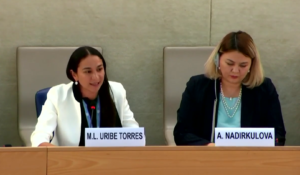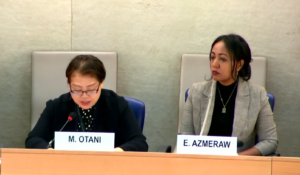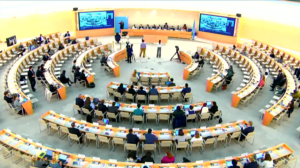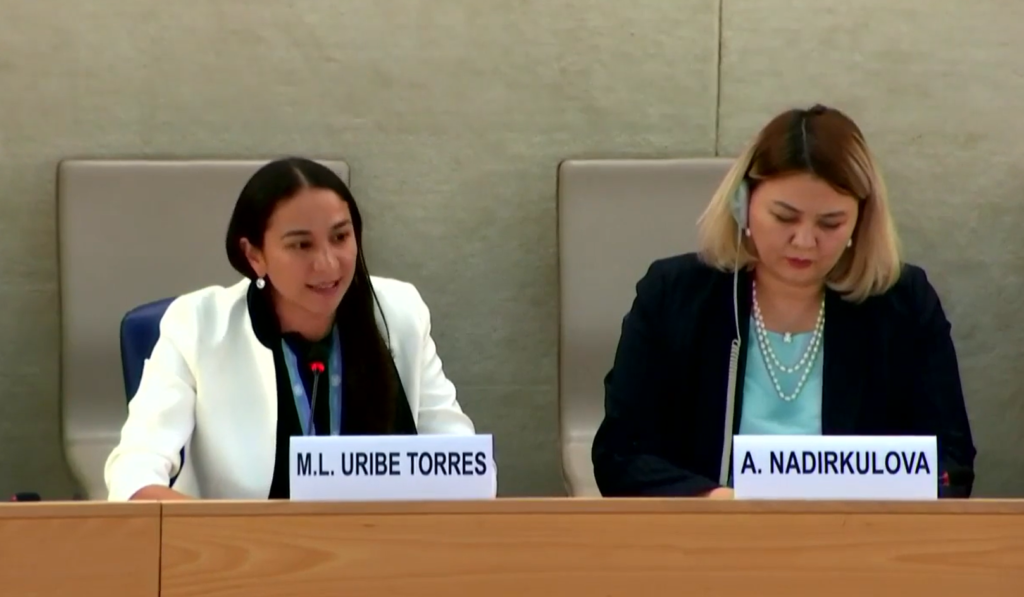
“Education is not neutral. It has two faces. It can either promote mutual understanding, respect, trust and collaboration, or it can exacerbate divisions, polarization, hatred and fear of the other,” said Ms. Maria Lucia Uribe, Director of Arigatou International Geneva, as she addressed global leaders and advocates in a panel discussion on Quality Education for Peace and Tolerance for Every Child at the 57th Session of the Human Rights Council.
The panel discussion, held on 18 September 2024, focused on Resolution 54/5, which emphasizes the need for accessible, equitable, and quality education that promotes peace and tolerance, especially for vulnerable children. The resolution, spearheaded by Kazakhstan, Kyrgyzstan, Tajikistan, Turkmenistan and Uzbekistan, aims to harness education as a tool for peacebuilding and societal harmony.
Opening the dialogue, Deputy High Commissioner for Human Rights, Ms. Nada Al-Nashif, drew attention to the 460 million children in the world who are deprived of education due to violence, stressing that peace education is crucial even in relatively peaceful societies. She warned that no nation is immune to structural violence, hate speech or gender inequality. “Empowering children with the knowledge, skills and values necessary to contribute to an equitable society is increasingly acknowledged across all United Nations pillars,” she stated reaffirming the role of education in the achievement of peace and security.
H.E. Ms. Alua Nadirkulova, Ambassador-at-Large of the Ministry of Foreign Affairs of Kazakhstan, representing the Central Asian nations behind the resolution, shared her country’s efforts in the repatriation and reintegration of children from conflict zones, including those returning from Syria and Iraq. As a result, over 200 children were enrolled in preschool education and more than 200 children were enrolled in schools. “Only through respect for human rights and fundamental freedoms can peace and tolerance be truly promoted,” she concluded.

Member and former Chair of the UN Committee on the Rights of the Child, Ms. Mikiko Otani, emphasized the critical role of education in fostering peace, tolerance, and human dignity, asserting that “education is the key” to building sustainable peace, especially for children affected by conflict. Drawing on Article 26 of the Universal Declaration of Human Rights and the Convention on the Rights of the Child, she called for the integration of peace education and human rights education into school curricula worldwide, starting from early childhood.
UNESCO’s Ms. Eyerusalem Azmeraw, representing the International Institute for Capacity Building in Africa (IICBA), showcased the organization’s contributions to peace education in collaboration with Arigatou International. She shared success stories from initiatives in Nigeria, Tunisia, Algeria, Kenya and Uganda. Ms. Azmeraw also called for adequate resource allocation for peace education, strengthened teacher training institutions, community engagement, and multi-sectoral collaboration among other necessary measures.
Drawing on Arigatou International’s experience in over 50 countries, Ms. Uribe stresses the need for education systems to address structural violence, promote equity and empower children to work together across differences. She called for a whole-community approach, involving governments, religious communities, teachers and families, to create sustainable peace.

A key moment during the session was a video message from 15-year-old Vinaya, a child rights advocate from India. Vinaya spoke powerfully about the struggles faced by minority and disabled children in accessing education, stressing the vital role peace education can play in creating a more inclusive world. “We can make this world a better place by learning to live in harmony with others,” she reminded the audience.
Numerous states expressed strong support for the resolution during the session. Lithuania, Afghanistan and Ivory Coast highlighted the ongoing discrimination against girls in education. Sierra Leone, Namibia, Luxembourg and Mauritius advocated for free education to ensure universal access. Concerns about harmful rhetoric in educational materials were also raised by representatives from Israel, Armenia and Palestine.
The outcomes of the panel discussion will contribute to a comprehensive report on best practices and recommendations for advancing quality education for peace and tolerance. This report will be presented at the 59th session of the Human Rights Council and will inform the 2025 United Nations Peacebuilding Architecture Review.
Arigatou International remains steadfast in its commitment to fostering education systems that nurture values of peace and mutual understanding, empowering children to become key actors in building a peaceful and inclusive future.
